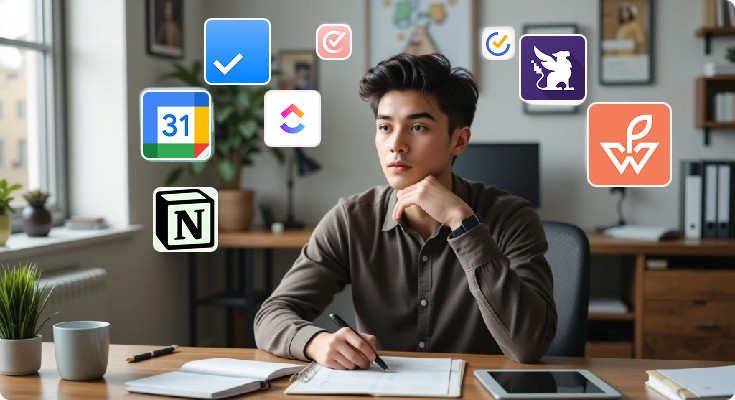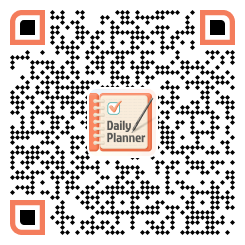Whether you’re a student, a professional, or just looking to stay organized, with the help of daily routine apps, you can easily manage your time, habits, and goals. Additionally, you can also use a daily planner app to manage your daily routines and tasks as well.
In this guide, you’ll know the best daily routine apps that will help you plan smarter, track progress, and build lasting habits with reminders.
What are the Best Daily Routine Apps in 2026? (Free & Paid)
Here’s our handpicked list of the best apps to plan a daily routine this year, each designed to help you plan, track, and stay productive:
- PlanWiz – Create, edit, download & share daily routine.
- Habitica – Turns tasks into fun challenges & rewards.
- Google Calendar – Easy scheduling & syncing across devices.
- Todoist – Task manager with priorities & reminders.
- TickTick – Task lists and Pomodoro timer for focus.
- ClickUp – All-in-one team planning & project management app.
- Loop Habit Tracker – Track & visualize habits with charts.
- Structured – Clear, hour-by-hour visual routine planner.
- Any.do – Sleek planner with tasks, calendar & reminders.
- Notion – All-in-one customizable planner & habit tracker.
1. PlanWiz – Best for Customizable Daily Routine App
If you’re looking for a daily routine planner that saves time and removes the hassle of building schedules from scratch, Planwiz is the perfect choice.
Unlike most apps that only give you blank planners, Planwiz comes with ready-made daily planner templates that you can edit, download, and share.
Whether you’re a student preparing a study schedule, a professional balancing work and personal goals, or someone focused on health and lifestyle habits, Planwiz has pre-designed daily routine planner templates to fit every need.
This makes it one of the easiest apps for beginners, while still being flexible enough for busy professionals.
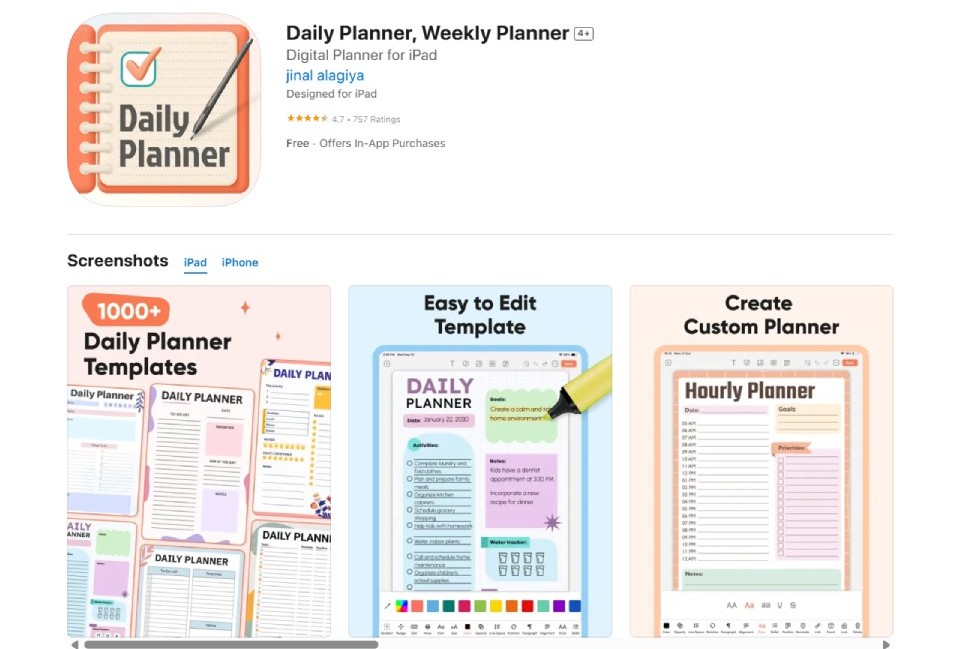
Key Features:
- Editable multiple planner templates (daily, weekly, monthly, yearly, health, business, event)
- Downloadable & shareable plans for group use
- Templates tailored for study, work, fitness, and personal life
- Simple, distraction-free interface for quick planning
- Saves time with ready-to-use templates
- Extremely easy to edit and customize
- Perfect for beginners and non-tech users
- Shareable with friends, family, or colleagues
- Focused on practical use instead of overcomplicated tools
- Limited task management compared to apps like Todoist or TickTick
- Still growing in advanced integrations
You can also access Planwiz in a website form to track your daily routines and organize every aspect of your life effortlessly.
Best For: Anyone who wants to start routines quickly using pre-made templates without spending hours designing.
Rating: (4.8/5)
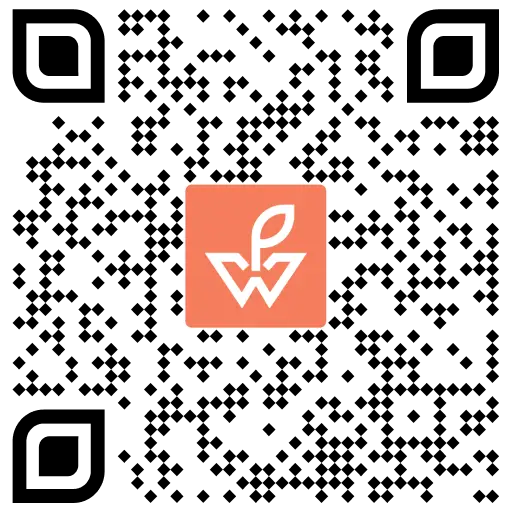
2. Habitica – Gamified Routine Tracking
Habitica turns your daily tasks into a role-playing game (RPG). Completing habits and routines earns you rewards, while skipping them costs you progress. It’s perfect for anyone who struggles with motivation.
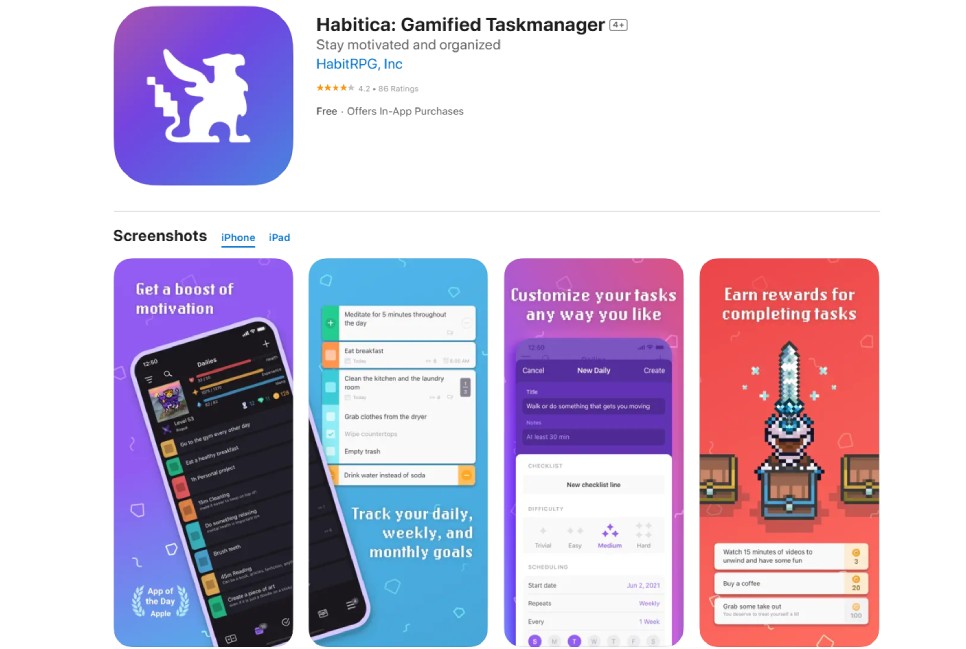
Key Features:
- Gamified task and habit tracking
- Avatar leveling, rewards, and penalties
- Party system for accountability with friends
- Cross-platform app (iOS, Android, web)
- Habit streak tracking
Pros:
- Fun and motivating for gamification fans
- Community-based challenges
- Free with optional premium upgrades
Cons:
- The interface looks dated
- Limited productivity integrations
Best For: People who enjoy gaming and want motivation to stick to routines.
Rating: (4.4/5)
3. Google Calendar – Simple Scheduling & Reminders
Google Calendar remains a classic, providing free scheduling tightly integrated with the Google ecosystem. It’s ideal for managing appointments, tasks, and reminders in one place.
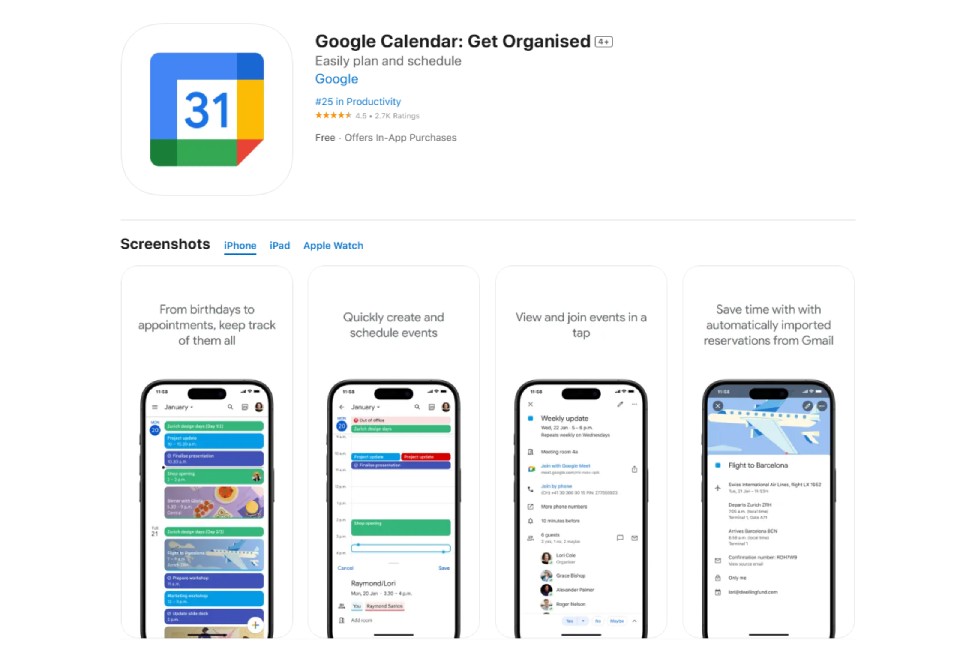
Key Features:
- Multiple calendar support
- Smart event creation with natural language
- Deep Gmail and Google Meet integration
- Easy calendar sharing
- Customizable reminders (email, push, pop-ups)
- Works across all devices
Pros:
- Completely free
- Excellent for collaboration and sharing
- Reliable sync and performance
- Strong integration with Google Workspace
Cons:
- Limited customization options
- Lacks advanced templates
- Offline features are minimal
Best For: Users who already rely on Google services and want a reliable, straightforward routine planner.
Rating: (4.6/5)
4. Todoist – Best for Task Management & Routines
Todoist combines task management with habit tracking, making it a great choice for busy professionals and students. Its clean interface and advanced features make it one of the most popular productivity tools.
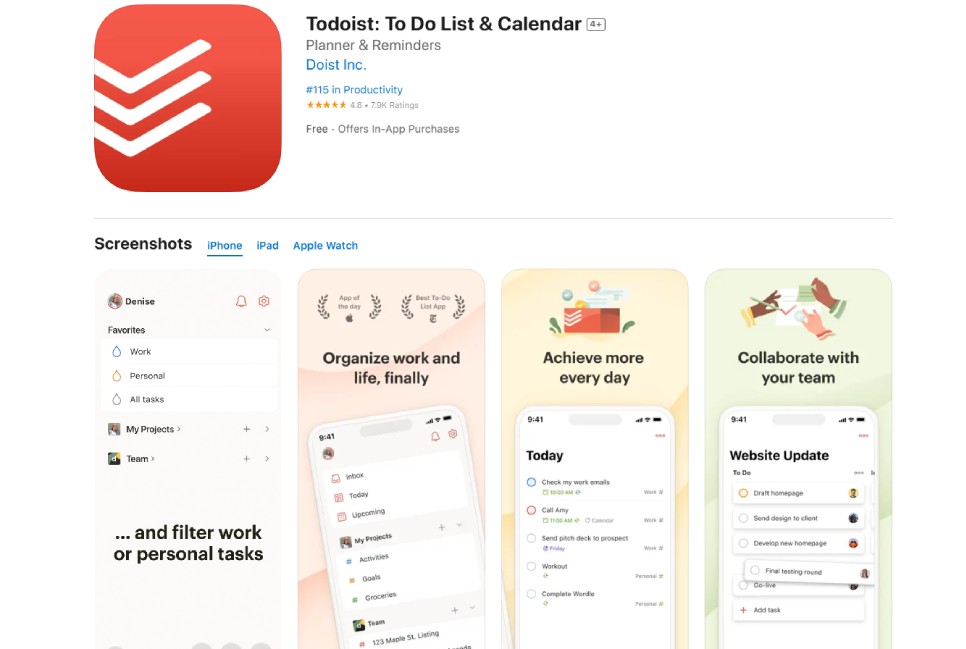
Key Features:
- Task organization with labels, filters, and priorities
- Recurring tasks for daily habits
- Integration with Gmail, Slack, and more
- Kanban-style boards
- Offline support
- Cross-device syncing
Pros:
- Clean and minimal interface
- Great balance between simple and advanced features
- Strong collaboration tools
- Excellent mobile experience
Cons:
- Most advanced features require Premium
- No built-in gamification or fun elements
Best For: Professionals and students who want a powerful task + routine combo.
Rating: (4.8/5)
5. TickTick – Routine + Productivity Combo
TickTick is a versatile productivity app that blends daily routine planning with to-do lists, calendars, and habit tracking. Its Pomodoro timer sets it apart from many competitors.
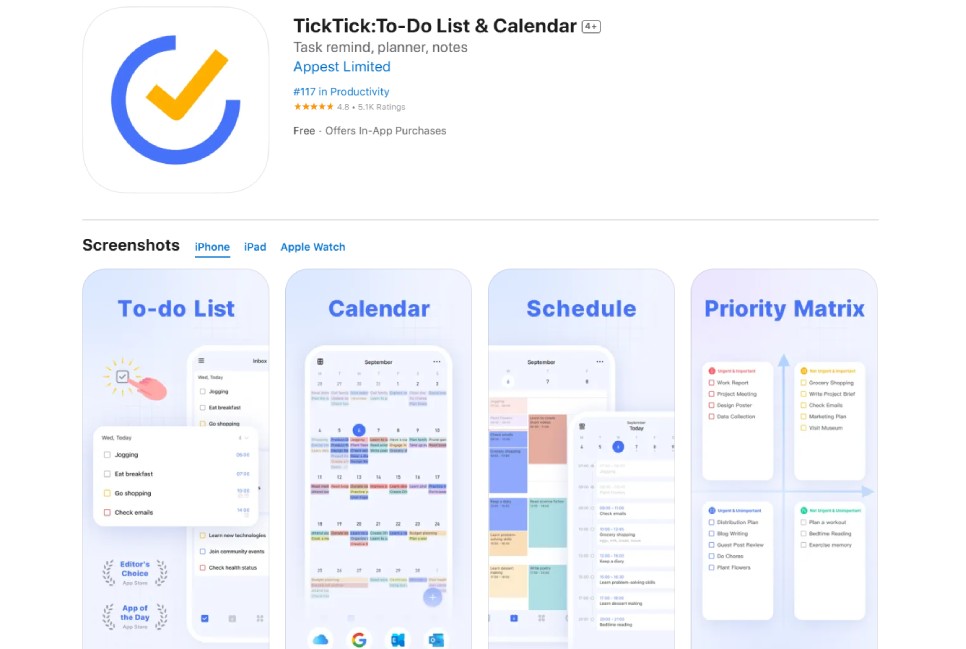
Key Features:
- Daily habit tracking + task management
- Built-in Pomodoro timer
- Customizable calendar views
- Collaboration and sharing options
- Cross-platform (Windows, macOS, iOS, Android, web)
- Smart lists and recurring tasks
Pros:
- Combines multiple tools in one
- Great for productivity enthusiasts
- Smooth interface with calendar sync
- Affordable pricing
Cons:
- The free version has feature limits
- Can feel cluttered for beginners
Best For: Users who want both a routine app + productivity tool in a single platform.
Rating: (4.7/5)
6. ClickUp – Best for Team Planning & Project Management
ClickUp is an all-in-one productivity platform designed for both individuals and teams. It goes beyond simple task management by offering project tracking, goal-setting, time tracking, and collaboration features, making it a powerful choice for professionals and organizations
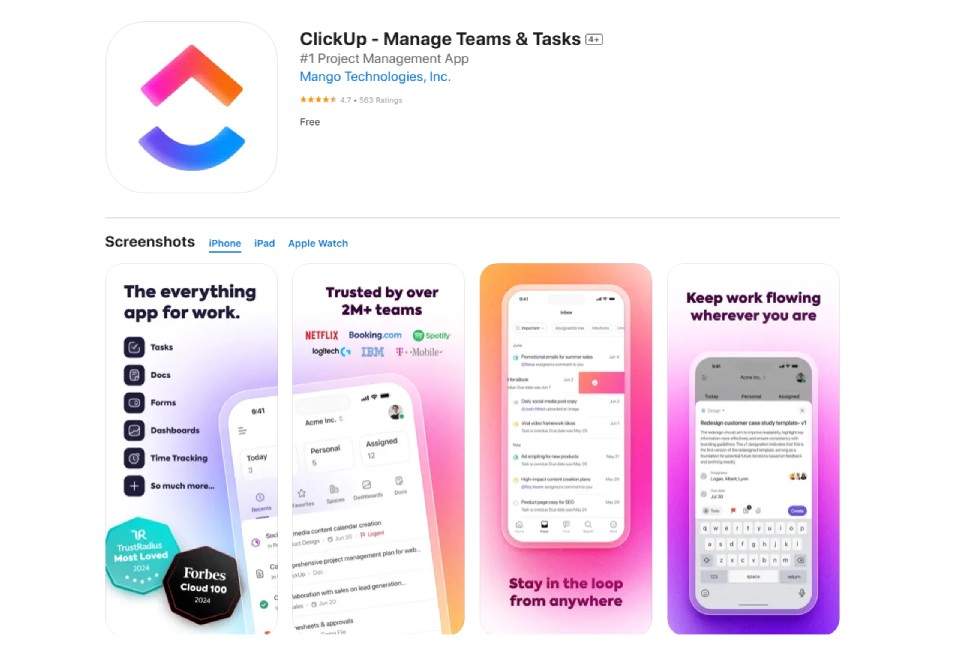
Key Features:
- Task and project management with priorities
- Multiple views: List, Board, Calendar, Gantt, and more
- Time tracking and goal-setting tools
- Real-time collaboration with docs & whiteboards
- Integrations with Slack, Google Drive, Zoom, and more
- Cross-platform (iOS, Android, Web, Desktop)
Pros:
- Highly customizable workflow
- Great for individuals, teams, and businesses
- Wide range of integrations
- The free plan is generous
Cons:
- It can feel overwhelming due to too many features
- Slight learning curve for beginners
Best For: Teams and professionals who need advanced project management and routine planning in one app.
Rating: (4.3/5)
7. Habit Tracker – Minimalist Habit Tracking
habit tracker is a clean and open-source habit tracker that helps you build and maintain routines without distractions.
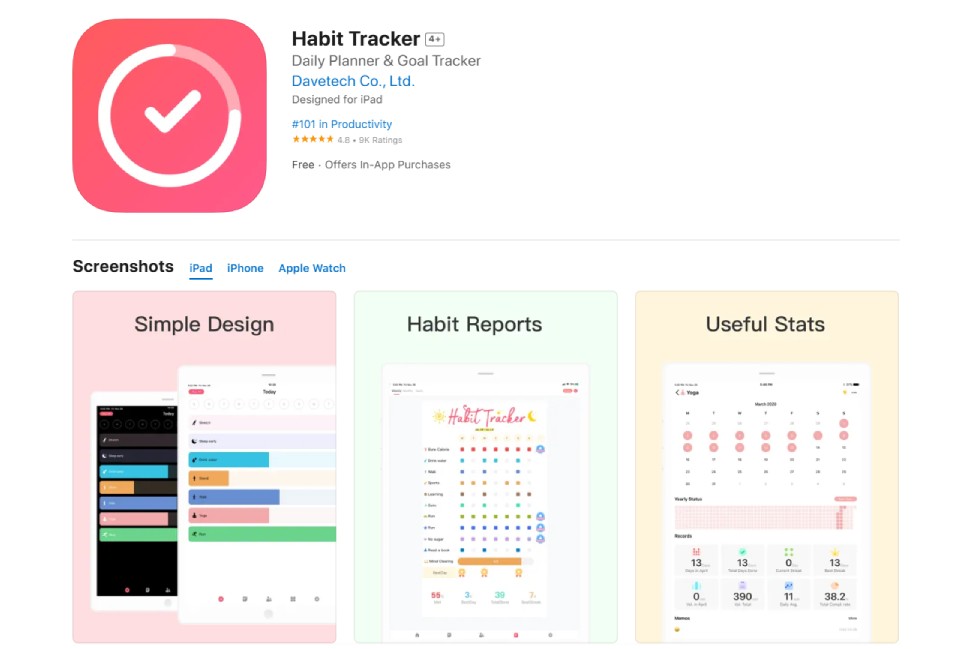
Key Features:
- Habit tracking with streaks and graphs
- Detailed habit analytics
- Widgets for quick access
- Offline functionality
- Completely free and open-source
Pros:
- Free, with no ads
- Lightweight and fast
- Great analytics for habits
- Focused on simplicity
Cons:
- No task management
- Only available on Android
- No collaboration features
Best For: Minimalists and Android users who just need habit tracking.
Rating: (4.5/5)
8. Structured – Visual Time Blocking for Routines
Structured is a visual time-blocking app that helps users schedule every hour of their day. Its drag-and-drop interface makes planning routines intuitive.
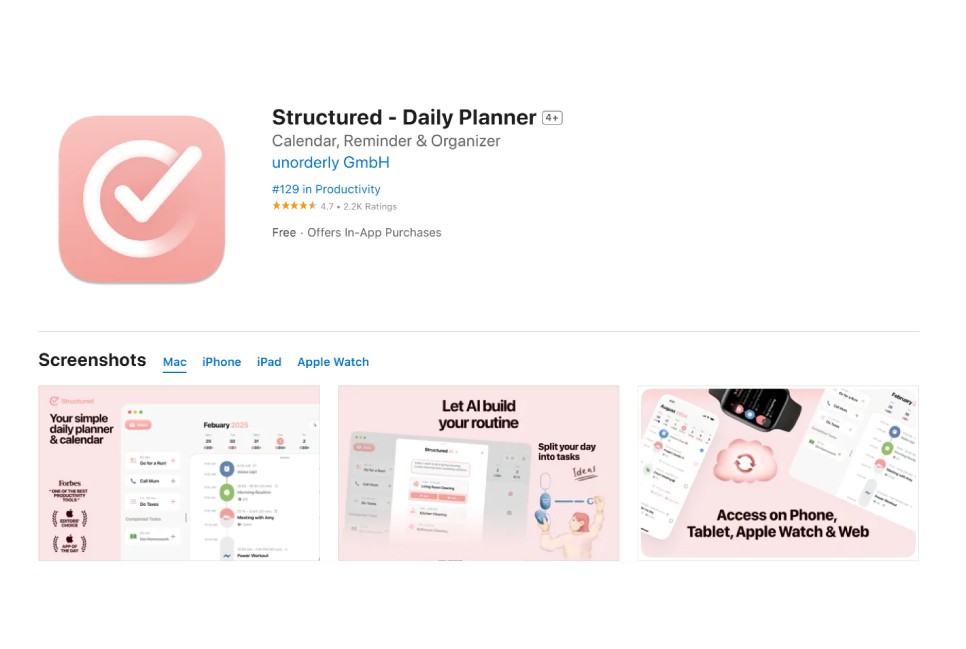
Key Features:
- Hourly/day planner with visual blocks
- Drag-and-drop task scheduling
- Cross-device syncing (iOS, Mac)
- Custom reminders and notifications
- Calendar integration
Pros:
- Intuitive visual design
- Great for micro-scheduling
- Clean and distraction-free
- Popular among iOS users
Cons:
- iOS/Mac only (no Android or Windows)
- Limited collaboration features
- The free version is restricted
Best For: Students and professionals who like time-blocking and visual planners.
Rating: (4.6/5)
9. Any.do – Best Cross-Device Syncing
Any.do is a sleek productivity app known for its cross-device syncing. It combines task lists, reminders, and calendars into one platform.
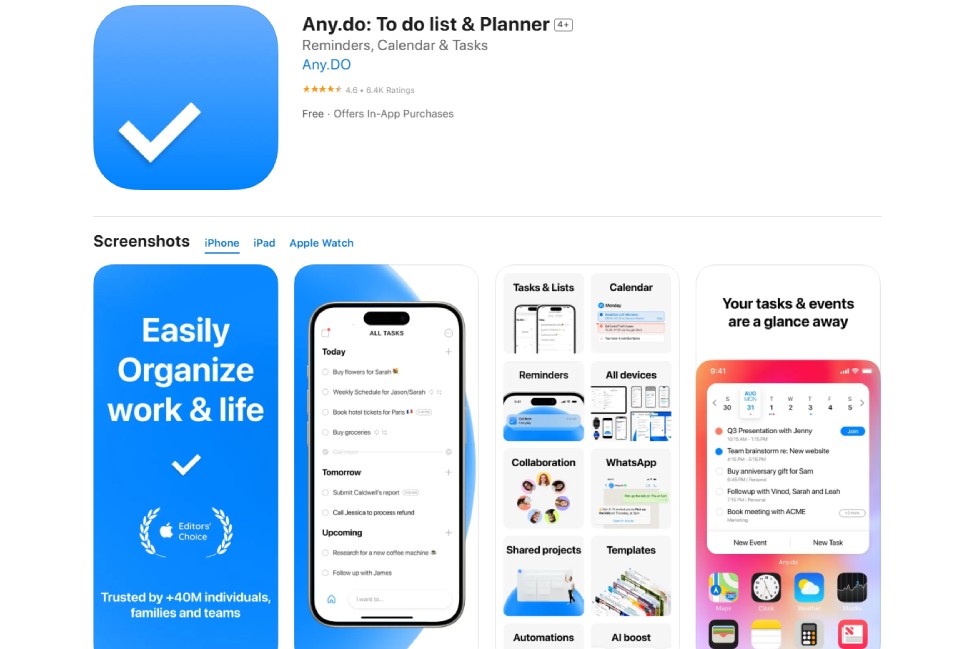
Key Features:
- To-do lists, calendars, and reminders
- Daily planner view (“My Day”)
- Voice input for task creation
- Real-time syncing across all devices
- Collaboration and sharing features
Pros:
- Beautiful, clean interface
- Excellent cross-device support
- Easy to set up and use
- Strong reminder system
Cons:
- Some features are locked behind a premium
- Can feel similar to other apps
- Not ideal for deep customization
Best For: Users who prioritize syncing and accessibility across devices.
Rating: (4.5/5)
10. Notion – Best for Flexible Templates
Notion is a powerful all-in-one workspace that doubles as a routine app with endless flexibility. You can build custom planners, embed habit trackers, or use community-made templates. Its adaptability makes it a favorite for students and professionals.
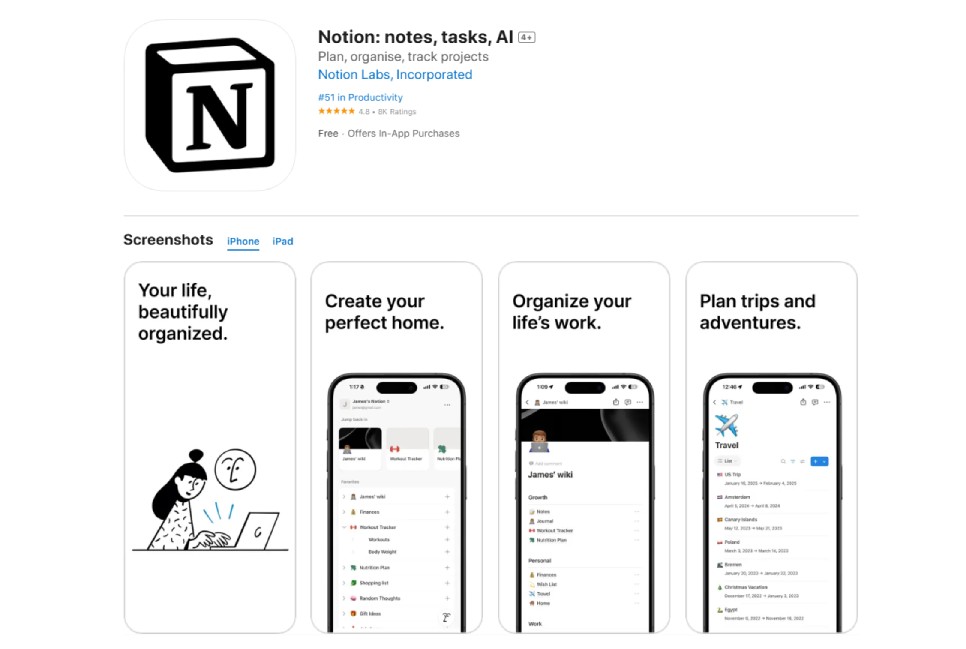
Key Features:
- Customizable databases, calendars, and boards
- Wide template library for routines and schedules
- Cross-platform syncing (Windows, macOS, iOS, Android, web)
- Collaboration tools for teams
- Integrations with Slack, Google Drive, and more
- Offline mode available
Pros:
- Extremely customizable
- An active community sharing free templates
- Great for both personal and professional use
- The free plan is generous
Cons:
- Learning curve for beginners
- It can be overwhelming if you just want simple reminders
Best For: Students and professionals who want maximum flexibility in designing daily routines.
Rating: (4.7/5)
Why Daily Routine Apps Are Essential?
Consistency is key in managing daily life. The app to manage daily routine helps maintain focus, track progress, and reduce the mental load of remembering everything. Best app to plan a daily routine to improve focus, consistency, and time management.
Key Benefits Include:
- For Students: Stay on top of assignments, exams, and study schedules with a daily routine schedule app.
- For Professionals: Balance meetings, project deadlines, and personal tasks effortlessly.
- For Health & Lifestyle Enthusiasts: Track workouts, meditation, and meal planning seamlessly.
Stats & Trends
- Productivity app downloads increased by over 20% in 2024.
- Millennials and Gen Z increasingly rely on planner and calendar apps over traditional methods.
Problems Solved
- Reduces procrastination.
- Prevents task overload.
- Helps remember important events and deadlines.
Benefits of Daily Routine Planner Apps
- Builds discipline and consistency.
- Enhances work-life balance.
- Boosts overall productivity using personal productivity tools.
What are the Key Features to Look for in a Daily Routine App?
Not all apps are created equal. The best daily schedule apps stand out because they combine simplicity, flexibility, and powerful tracking tools. When choosing the right planner app, you should focus on features that not only keep you organized but also help you stay motivated in the long run.
Here are the must-have features to look for:
Customizable Templates
- Pre-made daily, weekly, and monthly routine templates that save setup time and can be easily personalized.
- Use daily schedule templates to save time.
Reminders & Notifications
- Gentle reminders for tasks, habits, and events to help you stay consistent without overwhelming you.
- Perfect for students using a daily routine reminder app.
Calendar Syncing
- Integrates with Google or Apple Calendar.
- Ideal for professionals needing task deadlines and meetings in sync.
Cross-Device Access
- Access routines on mobile, tablet, and desktop.
- Ensures you never miss a task when switching devices.
Sharing Options
- Share schedules with family, friends, or colleagues.
- Useful for family organization apps or team planning.
Free vs. Paid Features
- Many apps are free with basic features, but premium upgrades unlock advanced tools like goal-setting, analytics, and integrations.
How do Daily Routine Apps Help Different Audiences?
Daily reminder apps are versatile and serve different needs, similar to how the best planners for different types of people can help individuals find planning tools that match their unique routines and preferences.
- For Students:
- These apps help students manage their class schedules efficiently.
- They allow tracking of assignments and exam preparation while also enabling planning of focused study sessions with timely reminders.
- For Professionals:
- Professionals can organize meetings and deadlines seamlessly using these apps.
- They also help balance personal and work life effectively and assist in managing long-term projects without missing critical tasks.
- For Health & Lifestyle Enthusiasts:
- Health-conscious users can schedule workouts and meditation sessions easily.
- These apps support tracking of nutrition and meal prep and help in building sustainable lifestyle habits over time.
- For Families:
- Families can coordinate shared schedules and manage household chores efficiently.
- They also facilitate planning of family activities, ensuring everyone stays on the same page and routines run smoothly.
How to Build a Consistent Daily Routine Using Apps?
Here’s a simple 4-step process:
- Define Priorities – List key tasks: work, study, health, personal.
- Use Templates – Save time with ready-made daily schedule templates.
- Set Reminders – Keep consistency with smart notifications.
- Track Progress – Adjust routines as your lifestyle evolves.
Example: Morning Routine Template :
- 7:00 AM – Wake up & stretch
Do light stretching or yoga for 5–10 minutes.
Boosts energy, improves blood circulation, and reduces morning laziness. - 7:30 AM – Meditation/journaling
Spend 10–15 minutes meditating, practicing deep breathing, or journaling.
Helps calm the mind and set a positive intention for the day. - 8:00 AM – Breakfast
Eat a balanced meal (fruits, oats, smoothies, or eggs).
Fuels your brain and body for better focus during the day. - 8:30 AM – Study/work session
Block 1–2 hours for your most important task.- For Students: Revise notes, prepare for exams, or complete assignments.
- For Professionals: Start with priority tasks, reply to urgent emails, or plan projects.
Also, you can say them as morning routine apps that supercharge your day, organize your routines, and build sustainable habits over time.
Read More: Check out our full guide on Routine App for Students
Frequently Asked Questions
If you are a student and looking for the best daily routine apps, the good news is for you. Apps like Notion, Structured, and PlanWiz work best due to study templates and flexibility.
Yes, with an app like Planwiz, you can manage and share your daily routine or important tasks. This app also allows you to share schedules with friends or family members.
Yes, A daily routine reminder app offers features like smart notifications, syncing across devices, and customizable templates, making it more effective than traditional paper planners.
Yes, most daily routine planner apps work offline once you’ve created or downloaded your schedule. For example, PlanWiz lets you download your routines so you can access them without the internet.
Because they save time, reduce stress, and help maintain consistency. Using apps for daily routine makes it even simpler with ready-made schedules you can start using immediately.
People Also Ask
How do daily routine planners improve productivity?
Daily routine planners boost productivity by organizing tasks, setting clear priorities, and reducing distractions. They help build consistent habits, making it easier to manage time and achieve goals.
Which daily routine planner app has the best reminder features?
Apps like PlanWiz, TickTick, and Todoist stand out with smart reminders, recurring tasks, and customizable alerts, ensuring you never miss important tasks or deadlines.
Can a daily routine schedule app help with mental health?
Yes, routine apps reduce stress by adding structure, promoting mindfulness, and balancing work with self-care. They help users feel more focused and less overwhelmed.
What is the most downloaded daily routine planner app?
PlanWiz, Google Calendar, and Todoist are among the most downloaded apps, thanks to their user-friendly design, cross-device syncing, and powerful planning features.
Do daily routine apps include pre-made templates?
Yes, apps like PlanWiz and Notion offer customizable templates for daily schedules, fitness, and work routines, helping users save time and plan effortlessly.
Conclusion
These daily routine apps make it easier to balance studies, work, health, and personal goals.
Remember, when choosing the right day-to-day routine app, it’s important to take your time and make sure it ticks all your boxes, including its core value features, integrations, or cross-platform functionality. Carefully consider which app aligns best with your needs.
From customizable templates to reminders and cross-device syncing, the right app can transform your productivity. For a simple way to plan, track, and build habits, try Planwiz, a perfect tool to plan your day in under 10 minutes using this system.

